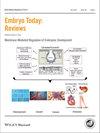Why boys will be boys and girls will be girls: Human sex development and its defects.
Q Medicine
引用次数: 27
Abstract
Among the most defining events of an individual's life, is the development of a human embryo into male or a female. The phenotypic sex of an individual depends on the type of gonad that develops in the embryo, a process which itself is determined by the genetic setting of the individual. The development of the gonads is different from any other organ, as they possess the potential to differentiate into two functionally distinct organs, testes, or ovaries. Sex development can be divided into two distinctive processes, "sex determination," which is the commitment of the undifferentiated gonad into either a testis or an ovary, a process that is genetically programmed in a critically timed manner and "sex differentiation," which takes place through hormones produced by the gonads, once the developmental sex determination decision has been made. Disruption of any of the genes involved in either the testicular or ovarian development pathway could lead to disorders of sex development. In this review, we provide an insight into the factors important for sex determination, their antagonistic actions and whenever possible, references on the "prismatic" clinical cases are given. Birth Defects Research (Part C) 108:365-379, 2016. © 2016 Wiley Periodicals, Inc.为什么男孩就是男孩,女孩就是女孩:人类的性发展及其缺陷。
一个人一生中最具决定性的事件之一是人类胚胎发育成男性或女性。个体的表现型性别取决于胚胎中发育的性腺类型,这一过程本身是由个体的遗传环境决定的。性腺的发育不同于任何其他器官,因为它们有可能分化成两个功能不同的器官,睾丸或卵巢。性发育可以分为两个不同的过程,“性别决定”是指未分化的性腺进入睾丸或卵巢的过程,这一过程是由基因以一种严格的时间方式编程的;“性别分化”是指性腺产生的激素,一旦发育性别决定决定已经做出。参与睾丸或卵巢发育途径的任何基因的破坏都可能导致性发育障碍。在这篇综述中,我们提供了对性别决定的重要因素的见解,它们的拮抗作用,并在可能的情况下提供了“棱镜”临床病例的参考。出生缺陷研究(分册),2016,38(8):379 -379。©2016 Wiley期刊公司
本文章由计算机程序翻译,如有差异,请以英文原文为准。
求助全文
约1分钟内获得全文
求助全文
来源期刊

Birth Defects Research Part C-Embryo Today-Reviews
DEVELOPMENTAL BIOLOGY-
CiteScore
3.65
自引率
0.00%
发文量
0
审稿时长
>12 weeks
期刊介绍:
John Wiley & Sons and the Teratology Society are please to announce a new journal, Birth Defects Research . This new journal is a comprehensive resource of original research and reviews in fields related to embryo-fetal development and reproduction. Birth Defects Research draws from the expertise and reputation of two current Wiley journals, and introduces a new forum for reviews in developmental biology and embryology. Part C: Embryo Today: Reviews
 求助内容:
求助内容: 应助结果提醒方式:
应助结果提醒方式:


